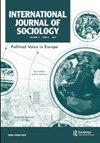Role of Religion and Secularism in Shaping Social Values, Norms and Identities in Various Societies and Communities in Egypt
IF 1.8
Q2 SOCIOLOGY
引用次数: 0
Abstract
Purpose: The aim of the study was to investigate role of religion and secularism in shaping social values, norms, and identities in various societies and communities in Egypt. Methodology: This study adopted a desk methodology. A desk study research design is commonly known as secondary data collection. This is basically collecting data from existing resources preferably because of its low cost advantage as compared to a field research. Our current study looked into already published studies and reports as the data was easily accessed through online journals and libraries. Findings: Religion, especially Islam, has historically been a significant influence on social values and norms in Egypt. The government has also played a role in promoting conservative religious interpretations. Egypt's religious diversity and evolving social movements have contributed to a dynamic environment where religion and secularism intersect in shaping societal identities and values. Unique Contribution to Theory, Practice and Policy: Social identity theory & secularization theory& religious pluralism theory may be used to anchor future studies on role of religion and secularism in shaping social values, norms, and identities in various societies and communities in Egypt. Encourage interfaith dialogue and initiatives that foster mutual understanding and respect among religious and secular communities. Develop and implement policies that safeguard religious freedom and secularism as fundamental human rights.宗教和世俗主义在塑造埃及不同社会和社区的社会价值观、规范和特性方面的作用
目的:本研究旨在调查宗教和世俗主义在埃及不同社会和社区中塑造社会价值观、规范和身份认同方面的作用。研究方法:本研究采用案头研究法。案头研究设计通常被称为二手数据收集。这主要是从现有资源中收集数据,因为与实地研究相比,它具有成本低的优势。我们目前的研究调查了已经出版的研究和报告,因为这些数据可以通过在线期刊和图书馆轻松获取。研究结果宗教,尤其是伊斯兰教,历来对埃及的社会价值观和规范有着重要影响。政府在推广保守的宗教解释方面也发挥了作用。埃及的宗教多样性和不断发展的社会运动形成了一个动态的环境,宗教和世俗主义交织在一起,塑造了社会身份和价值观。对理论、实践和政策的独特贡献:社会认同理论、世俗化理论和宗教多元化理论可用于今后对宗教和世俗主义在塑造埃及不同社会和社区的社会价值观、规范和认同方面的作用进行研究。鼓励宗教间对话以及促进宗教团体和世俗团体之间相互理解和尊重的倡议。制定和实施保障宗教自由和政教分离的政策,将其作为基本人权。
本文章由计算机程序翻译,如有差异,请以英文原文为准。
求助全文
约1分钟内获得全文
求助全文

 求助内容:
求助内容: 应助结果提醒方式:
应助结果提醒方式:


